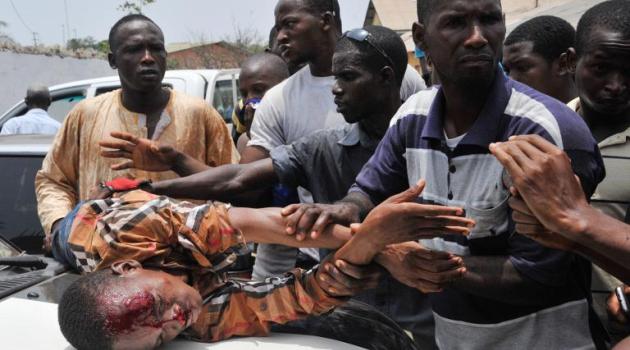
People assist a protester injured during clashes with police at an anti-government protest in Conakry on April 20, 2015/AFP
CONARKY, April 23-Guinea’s opposition sought to spur protests across the country against a disputed election timetable on Thursday after days of violent clashes in the capital, even as the president ruled out any review.
Violence between supporters of the opposition Union of Republican Forces (UFR) and police during unauthorised protests in Conakry left several dead in recent days, but supporters are undeterred and seeking to consolidate their regional backing.
Guinean President Alpha Conde insisted Wednesday that the country’s constitution rules out the kind of changes to the election timetable sought by opposition supporters.
“The Guinean constitution requires that presidential elections take place on a precise date,” Conde told reporters after a meeting with French President Francois Hollande in Paris. “We will do everything possible to maintain order in the republic.”
The current timetable schedules the presidential vote for October, ahead of local elections next year.
After the protests in Conakry on Monday, opposition leader Cellou Dalein Diallo, who lost to Conde in the second round of a 2010 election, called on his supporters to take to the streets once again on Thursday, but this time across all of Guinea.
Diallo said the motivation behind the president’s refusal to budge on the timetable was fear of defeat if the local vote was brought forward.
“It is not as easy to commit fraud in local elections as it is in national ones — he would not be able to justify hijacking the vote,” the opposition leader told AFP in an interview.
Conde’s Rally of the Guinean People party “couldn’t justify victory in a presidential election” if it suffered heavy losses in a local vote, Diallo added.
Justice Minister Cheick Sako, who is charged with negotiating with the opposition, played down his leader’s comments and urged the opposition not to refuse the “outstretched hand” of the government.
Guinea’s opposition boycotted parliament in March in protest over the timetable for the presidential ballot, accusing Conde of using the Ebola epidemic as an excuse to postpone voting.
The opposition had called for the local elections — originally planned for the beginning of 2014 — to be held before the presidential vote but they will now not take place until March 2016, according to the election commission.
Diallo’s supporters claim the electoral timetable was pushed through without consultation and gives the ruling party an unfair advantage.
They are also angry about the fragile security situation in the west African nation, which they blame on Conde’s government.
The last election in Guinea — September 2013’s parliamentary vote — was delayed by almost three years, stoking deadly ethnic tensions that have dogged the nation’s politics since independence.
Conde came to power in 2010, becoming the former French colony’s first democratically elected leader.
One of the poorest countries in the region despite vast potential for mineral exploitation, Guinea was run by a succession of autocratic rulers after gaining independence from France in 1958.









































